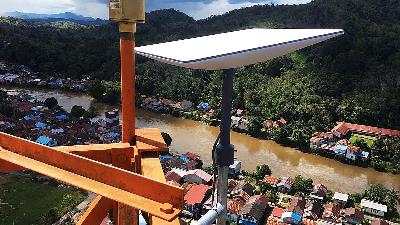The Pros and Cons of Starlink Expansion
Monday, May 20, 2024
Starlink starts to enliven the competition in the provision of internet services. There must be no protectionism that disadvantages the public.
arsip tempo : 174547843267.

INDONESIAN Internet service providers must prepare themselves for the entry of Starlink as a strong competitor in the country. There is no use in local companies complaining incessantly because the arrival of Starlink’s disruptive technology is inevitable. Local companies need to improve their service and foster innovation, so they are not left behind by this new foreign player.
In April, Starlink, which is operated by SpaceX, a company owned by American tycoon Elon Musk, obtained two permits related to the provision of Internet services, namely licenses for a fixed private network, or VSAT, and for Internet service provider, or ISP. These permits mean Starlink will be in direct competition with the Telkom Group, First Media by the Lippo Group, MyRepublic from Sinar Mas, IconNet owned by state-owned electricity company PLN, and hundreds of other operators.
Previously, Starlink was only allowed to operate in Indonesia as a provider of backhaul services, supporting infrastructure for local Internet providers. Starlink worked with Telkomsat—a company affiliated with Telekomunikasi Indonesia, or Telkom. From initially being a partner, Telkom will now have to compete with Starlink, which has low earth orbit satellite technology. Other operators do not have access to this technology.
In the eyes of consumers, the entry of Starlink offers more choice. Consumers have long been complaining about the services provided by local operators, who arbitrarily set tariffs without providing a satisfactory service. Another longstanding complaint is that the speed of Internet connections is less than promised. Moreover, instead of adding value, many consumers complain that local operators ‘force’ them to buy packets they do not need at fixed prices.
The arrival of Starlink also provides an opportunity for the provision of Internet services to isolated regions. In eastern Indonesia, such as Maluku and Papua, Internet tariffs are completely unreasonable. Not only ordinary people, but also forestry, mining and oil companies have long faced the same problem for years. Internet operators demand high prices that are not in line with the service provided. The people are still waiting for the government to build infrastructure such as fiber optic cables or transceiver towers, which recently have become projects rife with corruption.
The government and local telecoms industry players should see Starlink not as a threat, but as an incentive to continue developing. The disruptive low earth orbit satellite technology should not be seen as an enemy, but should be studied in order to produce innovative products. We should be proud if national products are able to surpass foreign technology, however we should not be trapped by faux nationalism or anti-competitive protectionism, which is directly against the interests of consumers.
Despite this, Starlink must prove that their services can satisfy consumers. The same is true for their business model: does it comply with the rules of healthy competition, or will it act dishonestly in the short term. The government should pay attention to the concern of many people about the predatory pricing model, in which prices are kept low at the start in order to take control of the market. If this happens, Starlink must not be allowed completely free rein, eventually disadvantaging all sides.











